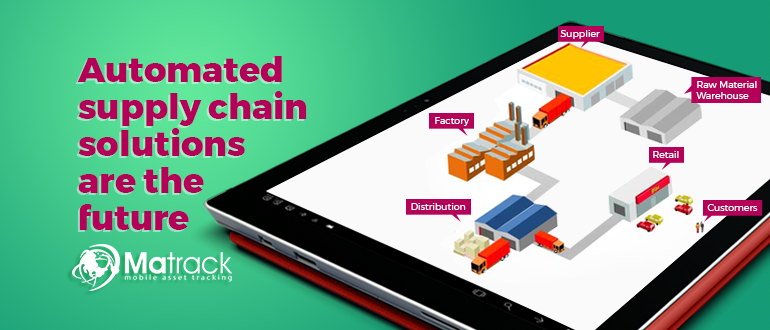How Automated Supply Chain Solutions can Assist Commercial Freight Carriers and Customers?
Content
Key Takeaways:
- 1. Why do we need automated solutions?
- 2. Benefits of a holistic supply chain solution
- 3. Organizational Pain Point- Reduced Visibility
- 4. Organizational Pain Point- Degraded Product Condition
- 5. Organizational Pain Point- Mismanaged Product Returns
- 6. Designing a Mitigation Plan
- 7. Conclusion-Automation is the Future
Digitized and automated supply chain solutions are considered assets to commercial freight carriers. Besides streamlining the movement of goods, shipment visibility, and other aspects of commercial whereabouts, these solutions are also pretty effective in minimizing the covid-19 induced threats. However, it is the adaptability and affordability that comes across as major concerns for most commercial carriers and truckers.
The automated supply chain solutions are feature-packed and completely validated when it comes to offering risk mitigation attributes to the carriers, customers, and even brokers. The existing set of services also helps increase overall productivity while minimizing costs courtesy of reduced wastage.
Why do we need automated solutions?

Starting from the point at which the freight is loaded to the point where the customer receives it, it is necessary to keep a remote eye of the vehicle and certainly the products. Be it tracking the vehicle safety or the physical condition of the concerned commercial driver, effective solutions make sure that accidents and other mishaps are avoided. Not just that, companies need tools to continually monitor the product conditions, in order to check for viability, temperature, and hygiene.
Most importantly, the automated solutions make it easier for the truckers and associated companies to maintain on-spec quality assurance besides improving the operational efficiencies in the best possible way. The best thing about a holistic supply chain solution is that is also allows customers to track the warehouse and storage activities, especially when they look for safety assurance during the pandemic.
Perks of having a Fully Automated Supply Chain Solution
Before we delve into the details and additional benefits of a fully automated supply chain management solution, we need to ascertain a tool that amalgamates GPS tracking, diverse visibility features, better interactive options between the drivers and customers.
To start with, a fully automated and well-rounded platform increases visibility. It means that while customers can get a complete picture of the activities that are happening at the yard, gate, or even the warehousing dock, the carriers can constantly monitor the vehicle and the associated freight throughout the journey.
The benefits do not end with increased shipment visibility and tracking. Instead, a complete digital suite makes sure that product returns, refusals, and revaluations are also handled with precision.
In the next few sections, we shall look at the pain points of the commercial freight carrying industry, including truckers and which areas would the supply chain solutions help fix, especially when we move into the post covid-19 era.
Reduced Shipment and Carrier Visibility
Lack of visibility is the biggest organizational bottleneck, especially when freight management is concerned. Issues crop up as soon as the product is stored in the warehouses or starts getting loaded onto the trucks. Not just that, during the pandemic where social distancing is a norm, carrier visibility at the pit stops and welcome centers is also an aspect that needs to be taken into account. Random visits and accumulation of drivers can put them at the risk of getting infected.
There are truckers who still keep manual logs which hinder the overall process and decreases the productivity. Moreover, once the shipment leaves the facility, the carriers and managers are mostly blindsided and only rely on the drivers to rely vital information to them. In case of sudden issues like roadblocks, detention, and inclement weather conditions, it becomes impossible to the carriers to know the status of the trucks or connect with the customers to convey information.
Products stored into the warehouses require monitoring. However, manual systems aren’t capable enough when it comes to offering continued visibility. Manual tracking depends on the workforce and it becomes tedious for them to check on every product before dispatching.
Lack of an automated solution, therefore, increases operational costs, dwell time, demurrage while hampering asset utilization.
Degraded Product Condition
With the pandemic hitting the commercial vehicle industry hard enough, the onus will be on the truckers to take good care of the freight. Most of the carriers find it hard to monitor the physical condition of the associated products. Drivers get down at select stops and check for the sanctity of the freight which isn’t enough if there are perishable goods inside.
When the products stays locked in for a considerable period of time, it tends to disintegrate, provided proper care isn’t taken during the course of the journey. Freight that isn’t monitored increases operational costs and significantly reduces carrier productivity. With truckers envisioning a new future post covid-19, it is necessary for them to abide by the host of FSMA guidelines. Adhering to the Sanitary Compliance is and will be a major guideline, going into the future.
Increased and Mismanaged Product Refusals and Returns
Firstly, if the freight isn’t taken care of, chances of refusals at the customer end increases. Therefore, it is important to take the second pain point into account and work towards improving the same. Moreover, even if the products are to be returned, the interactions between the customers and carriers must be seamless enough.
Lack of approval mechanism and proper logistical support means that the returns and product refusals are quite hard to deal with. In most of the existing scenarios, returns mean massive losses to the carriers with a cascading number of cancelled shipments. The returns take a lot of time to process which slows down the drivers and they fail to reach other pickup or delivery points in time.
Apart from that, even the customer-business relationships get strained, in case of returns and refusals. Carriers are often confused as how to deal with the return and refusal requests which eventually decreases the productivity costs.
How to Structure a Proper Mitigation Plan?
Having a holistic and digitized supply chain solution can work upon the mentioned organizational pain points.
Dealing with Visibility
Automated solutions can help carriers by improving visibility across different stages of the journey. For example, everything gets logged and monitored the moment the trucks leave the facility and the shipments are delivered. The automation platform offers accessibility to the drivers and workers at warehouses who can monitor and mark the products as shipped, the moment the freight leaves the facility. Another good way to go about the process is to use electronically efficient Vypin RE seals which allow carriers to track and tag the shipments with ease. A digitized tool streamlines the check-in and even the vehicle checkout process. In addition to that, it makes sure that the carriers can get actionable data to work with. With analytics available, it is easier to calculate the average dwell time, waiting time, and delivery time, before targeting each for improving productivity.
Moreover, with drivers having access to the platform, they can track the volume of trucks waiting outside pit stops to defer the arrivals. This approach keeps them safe from the covid-19 induced infections.
If you are actually looking for automated solutions that can take the visibility worries out of the equation, opting for credible firms like e4Score is the best way to go. Some of the more relevant feature-sets include:
- Significantly lower operational costs
- Increased utilization of assets
- Minimal dwell time
- Proper identification of pit stops
- Improved HOS standards
- Unified platform for diverse shipments
- Improved vehicle security
- 360-degree carrier-customer-driver collaboration
- Real-time data analysis
Dealing with Product Condition
Automated solutions make sure that the freight is constantly monitored in facilities and vehicles where the temperature compliance is adhered to. This flexibility allows carriers and customers to trace the product temperature and assess the hygiene levels based on video broadcasting support, if available. Most importantly, as the interface is strictly automated, the temperature and quality fluctuations at certain points of the journey get recorded automatically.
Here are some of the other perks of having an automated product monitoring platform:
- Auto alerting mechanism if the product conditions start deteriorating
- Automatic record keeping
- Temperature, location, and record compliance for all the involved parties
- Compliance with sanitary regulations
Dealing with Returns and Refusals
Carriers can simplify the return-refusal process by using the automated supply chain solution. The process can be simplified if the carriers have automated tools and decision making options at their disposal. For instance, if the customers want to return or refuse the product before arrival, they can place automated requests beforehand. The carriers can use the intelligent interface to identify the best course of action and make arrangements, accordingly.
In case the return costs are higher, ‘dump and destroy’ is a good way to go. Express Return and Refusal solutions are also great at generating documents and authorization slips faster than manual inclusions.
Some of the additional benefits include:
- Assured RA compliance
- Inclusion of Big Data and IoT-centric intelligence
- Minimized costs during claims, returns, detentions, and refusals
- Best-in-class authorization
Automation is the Future
As commercial carriers are slowly moving towards full time operations with businesses resuming in the country, it is necessary for them to adopt automated and digitized solutions for staying ahead of the competition. Evolution is the name of the game and in the post covid-19 era, it is necessary to make sure that all the aspects including visibility, hygiene, and customer experience, are taken care of, with digitized precision.
Not just that, despite automated supply chain management being an essential tool for most commercial freight carriers, nothing beats the usefulness of GPS tracking modules in commercial vehicles. Matrack is a GPS-centric platform that can track product quality, product returns, condition of fleet, and, remote equipment with considerable ease. Matrack is one organization that takes the entire fleet and cargo setup into account by offering adaptable and effective GPS solutions for the truckers. Services offered by Matrack are innovative, future-proof, and comprise of asset, fleet, and trailer tracking options.

